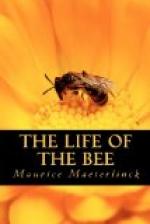[87]
Let us return to the tragic nuptials of the queen. Here it is evidently nature’s wish, in the interests of crossed fertilisation, that the union of the drone and the queen-bee should be possible only in the open sky. But her desires blend network-fashion, and her most valued laws have to pass through the meshes of other laws, which, in their turn, the moment after, are compelled to pass through the first.
In the sky she has planted so many dangers—cold winds, storm-currents, birds, insects, drops of water, all of which also obey invincible laws—that she must of necessity arrange for this union to be as brief as possible. It is so, thanks to the startlingly sudden death of the male. One embrace suffices; the rest all enacts itself in the very flanks of the bride.
She descends from the azure heights and returns to the hive, trailing behind her, like an oriflamme, the unfolded entrails of her lover. Some writers pretend that the bees manifest great joy at this return so big with promise—Buchner, among others, giving a detailed account of it. I have many a time lain in wait for the queen-bee’s return, and I confess that I have never noticed any unusual emotion except in the case of a young queen who had gone forth at the head of a swarm, and represented the unique hope of a newly founded and still empty city. In that instance the workers were all wildly excited, and rushed to meet her. But as a rule they appear to forget her, even though the future of their city will often be no less imperilled. They act with consistent prudence in all things, till the moment when they authorise the massacre of the rival queens. That point reached, their instinct halts; and there is, as it were, a gap in their foresight.—They appear to be wholly indifferent. They raise their heads; recognise, probably, the murderous tokens of impregnation; but, still mistrustful, manifest none of the gladness our expectation had pictured. Being positive in their ways, and slow at illusion, they probably need further proofs before permitting themselves to rejoice. Why endeavour to render too logical, or too human, the feelings of little




